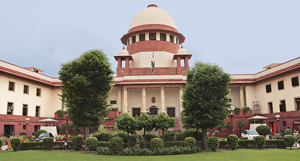New Delhi, May 2: The Supreme Court today agreed to hear tomorrow a fresh plea of few states, including Jammu and Kashmir and some private medical colleges, that they be allowed to conduct their pre-scheduled test for admissions in MBBS and BDS courses.
 "Let these applications be heard tomorrow by the bench concerned," a three-judge bench headed by Chief Justice T S Thakur said when a battery of senior lawyers including K K Venugopal and Gopal Subramaniam mentioned fresh applications for hearing.
"Let these applications be heard tomorrow by the bench concerned," a three-judge bench headed by Chief Justice T S Thakur said when a battery of senior lawyers including K K Venugopal and Gopal Subramaniam mentioned fresh applications for hearing.
Subramaniam, appearing for Jammu and Kashmir said that the entrance test being held by the state administration be allowed to go on as per schedule on the ground that it has been granted a special status.
Venugopal, who represented some private medical colleges of Karnataka, made similar pleas that the pre-scheduled entrance test may be permitted to go on alongside the National Eligibility Entrance Test (NEET).
Similar requests were made by the counsel representing Andhra Pradesh and Tamil Nadu. All these fresh pleas would be heard tomorrow by another bench headed by Justice A R Dave which had recently recalled its earlier order and permitted NEET to be conducted.
The apex court had on April 29, said that the entrance test for admission to MBBS and BDS courses for the academic year 2016-17 will be held as per the schedule through the two-phased common entrance test NEET on May 1 and July 24.
On April 28, the court had rejected opposition for holding NEET by states, including Tamil Nadu, Andhra Pradesh, Telangana, Uttar Pradesh and Association of Karnataka Medical Colleges, besides minority institutions like CMC, Vellore.
The apex court order had implied that all government colleges, deemed universities and private medical colleges would be covered under NEET and those examinations which have already taken place or slated to be conducted separately stand scrapped.
It had also revived the government's December 21, 2010 notification for holding a single common entrance test through NEET with a clarification that any challenge on the issue would directly come before it and no high court can interfere.






Comments
Add new comment